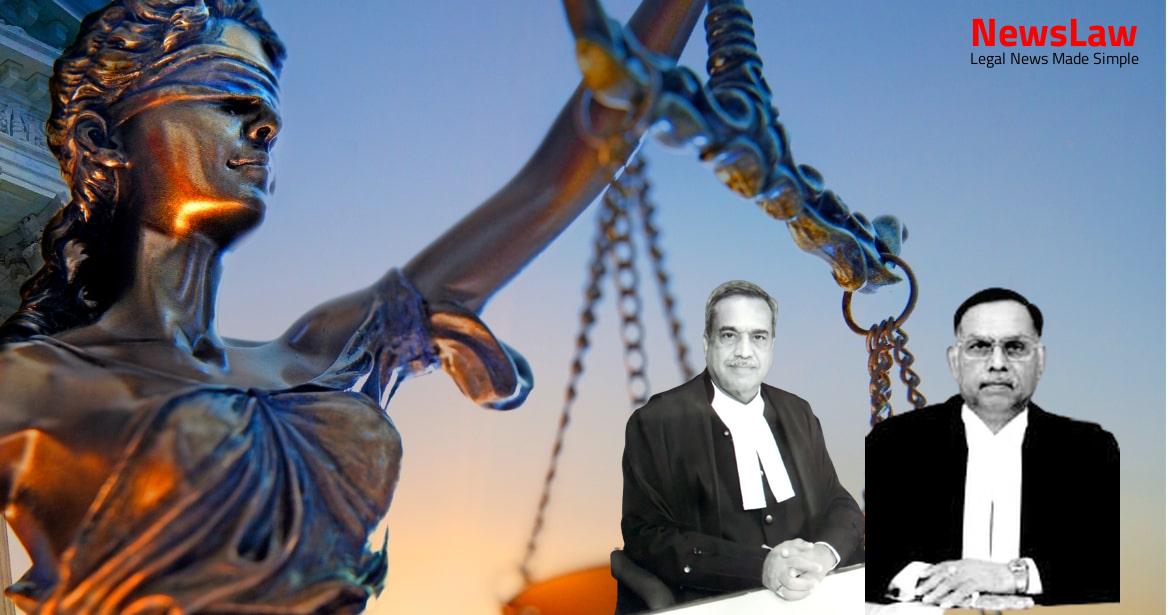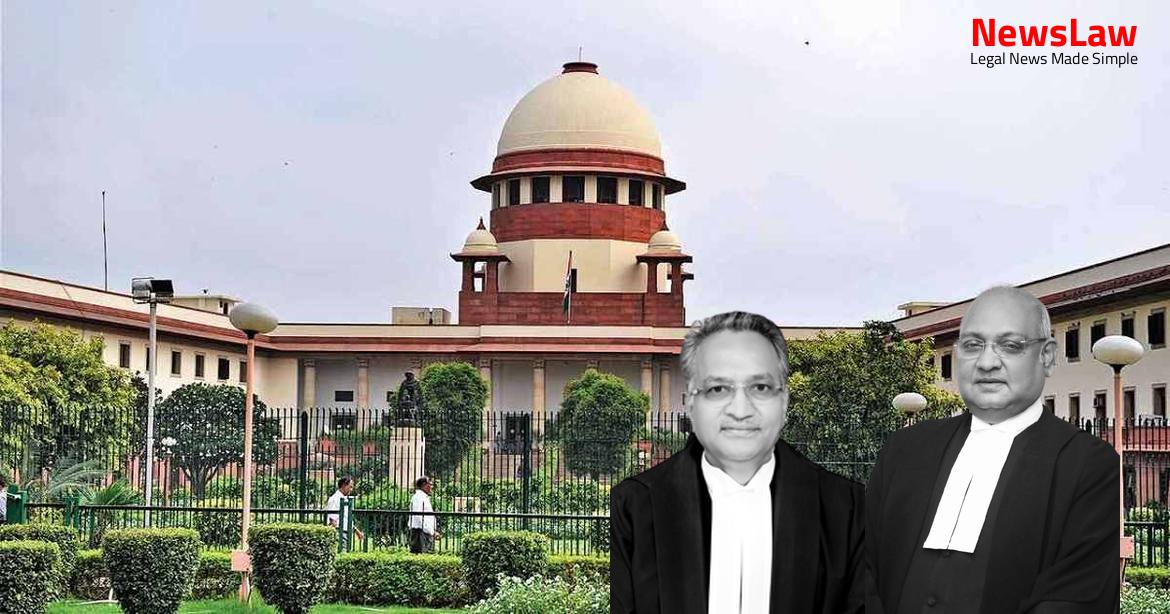This legal case delves into the intricate analysis by the court regarding directorial responsibility under FERA. The in-depth examination of factors like role, knowledge, and responsibility of directors in a company’s affairs is vital for understanding liability under FERA. Let’s explore the court’s legal insights on this complex matter.
Facts
- Between 12.06.1985-21.11.1985, 20 remittances were made by the Company-MXL through Standard Chartered Bank.
- Enforcement Directorate commenced proceedings under FERA, 1973 and FEMA.
- Personal hearing was fixed for 22.10.2003.
- An appeal was filed against decisions of Delhi High Court and the Appellate Tribunal for Foreign Exchange.
- Enforcement Directorate requested invoices and purchase orders from MXL in 1991-1993.
- A notice dated 08.10.2003 was sent to MXL and its Directors for contravention.
- RBI issued a letter regarding non-submission of required documents by MXL despite reminders.
- Affidavit by the Company Secretary stated appellant’s part-time directorial role.
- MXL’s merger into Xerox Modicorp Ltd. was mentioned in the summary.
- The appellant’s response to the show cause notice emphasized his non-executive role in MXL.
- The order of penalty imposed on the appellant was stayed by the Court on 19.02.2010.
- The penalty of Rs.1,00,000/- was imposed on the appellant for contravention of certain sections of FERA, 1973.
- The appellant filed an appeal against the penalty order in the Appellate Tribunal, which was dismissed on 26.03.2008.
- Subsequently, a Criminal Appeal No. 575 of 2008 was filed by the appellant in the Delhi High Court.
- The Delhi High Court, in its judgment dated 18.11.2009, dismissed the appeal of the appellant.
Also Read: Enhancing Compensation and Modifying Sentences: A Legal Analysis
Arguments
- Shri Sundaram argues that the High Court erred in dismissing the appeal of the appellant as there was no evidence or specific case showing the appellant’s responsibility for the Company’s actions.
- Mere listing of Directors by the Company does not establish the responsibility of all Directors for the business conduct.
- Prosecution under FERA, 1973 requires a finding that the appellant was in charge during the relevant period.
- The Appellate Tribunal held the appellant liable without establishing the appellant’s role in the Company’s affairs.
- The Adjudicating Authority imposed a penalty without determining the appellant’s responsibility based solely on the Company Secretary’s letter listing Directors.
- The appellant claimed to be a part-time, non-executive Director with no executive role or responsibility in the Company.
- Reference is made to the Saroj Kumar Poddar case where specific averments of being in charge were crucial.
- Judgments in the S.M.S. Pharmaceuticals Ltd. and N. Rangachari cases are discussed in relation to Director’s responsibilities.
- Proceedings against the appellant in a subsequent transaction were dropped upon accepting the appellant’s non-executive role.
- Order dated 13.02.2004 recognized the appellant’s status and role in the Company, leading to the discontinuation of proceedings.
- Appellant was a Director during the relevant period as admitted in the reply to the show cause notice.
- The burden is on the appellant to prove he had no role in the company’s conduct of business.
- Key points for determination in the appeal include the appellant’s role as a part-time, non-executive Director, and responsibility for the company’s conduct of business.
- Appellant’s plea of being a non-executive Director was questioned as an afterthought since it was not mentioned in the Company Secretary’s earlier reply.
- No material was presented to prove appellant’s role as a part-time, non-executive Director.
- The penalty imposed on the appellant was argued to be justified by the Additional Solicitor General, stating no effort was made by the appellant to disprove the allegations.
- Proceedings under FERA, 1973 do not require a specific complaint unlike under the Negotiable Instruments Act.
Also Read: Transfer of Writ Petitions for Chartered Accountants’ Tax Audit Guidelines
Analysis
- The Board established that the contraventions alleged were without the knowledge and involvement of the appellant.
- The provisions of Section 51 contemplate giving the person a reasonable opportunity to make a representation, including communication of allegations of contravention.
- The liability under Section 68 of FERA, 1973 depends on the role one plays in the company’s affairs, not just the designation or status.
- Criminal liability is strict and conditions must be strictly complied with.
- The appellant’s role as a part-time non-executive Director, not in charge of day-to-day business, was an essential plea that required consideration.
- The High Court erred in discarding the appellant’s plea without proper evaluation of the evidence presented.
- Written representations by the appellant were crucial and should have been duly considered by the adjudicating officer.
- The Directors’ responsibility for company conduct at the relevant time determines liability under FERA, 1973.
- The order dated 13.02.2004 recognized the appellant’s part-time director status and non-responsibility for company affairs.
- The affidavit of the Company Secretary supported the appellant’s claim of being a part-time non-executive Director not responsible for the company’s day-to-day business.
- The plea of being a non-executive Director should have been properly evaluated before imposing penalties.
- The High Court’s dismissal of the appellant’s plea as an afterthought was unfounded and based on incorrect assumptions.
- Section 68(1) of the FERA, 1973 creates a legal fiction where a person in charge of and responsible to the company for the conduct of business shall be deemed guilty of contravention.
- The provision does not apply to all directors of a company, only those who were in charge and responsible for the business at the time of the contravention.
- Similar provisions exist in Section 141 of the Negotiable Instruments Act, 1881, extending criminal liability to officers of the company if an offence is committed by the company.
- The adjudicating officer must hold an inquiry and give the person an opportunity to make a representation in the matter.
- Vicarious liability for criminal offences under Section 141 of the Negotiable Instruments Act applies to those in charge and responsible for the company’s business at the time of the offence.
- Strict interpretation of penal statutes mandates that individuals can only be prosecuted if they were in charge and responsible for the company’s business.
- A company can only act through its Board of Directors, with the Managing Director being prima facie in charge and responsible for the company’s business.
- Other Directors can only be prosecuted if they were in charge and responsible for the company’s business.
- Not every person connected with the company falls within the ambit of the provision.
- In commercial transactions with a company, it is presumed that the Directors are in charge of the company’s affairs.
- The presumption is rebuttable, and essential ingredients of an offence under FERA must be communicated for imposing a penalty.
- Section 68 FERA deals with offences by companies, holding persons responsible for contraventions committed by the company.
- The person must be specifically alleged to be in charge and responsible for the company’s conduct to be liable.
- Liability arises from being in charge and responsible for the company’s conduct at the relevant time.
- The key conditions for liability under Section 141 include having a role in the incriminating act and knowledge of the attribution to him.
- Only those in charge and responsible for the company’s conduct at the time of the offence are liable for criminal action.
- The complaint must disclose necessary facts to make a person liable under Section 141.
- The adjudicating officer erroneously imposed a penalty on the appellant for the alleged offence under Section 8(3), 8(4), and 68 of the FERA, 1973.
- This order was inaccurately affirmed by both the Appellate Tribunal and the High Court.
Also Read: Analyzing Interference with Acquittal in Legal Conviction Case
Decision
- The appellant is being informed that the case may be decided without personal attendance based on available evidence.
- Non-appearance may lead to the Adjudication Authority proceeding with the enquiry in the appellant’s absence.
- The Adjudication Order may be passed based on the material and evidence available.
- The appeal has been allowed, setting aside the judgments of the High Court, adjudicating officer, and the Appellate Tribunal.
- The penalty imposed on the appellant has been set aside as a result of the appeal being allowed.
Case Title: SHAILENDRA SWARUP Vs. THE DEPUTY DIRECTOR,ENFORCEMENT DIRECTORATE (2020 INSC 465)
Case Number: Crl.A. No.-002463-002463 / 2014



